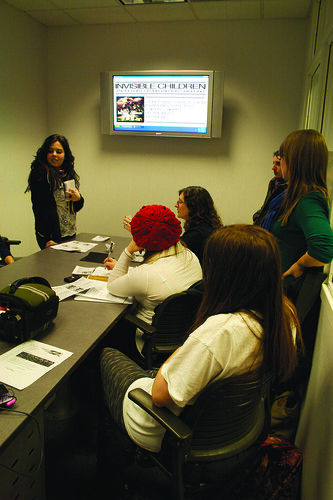A new organization is working to inform and involve students about a conflict in Uganda.

For more than 20 years, Uganda has been plagued by civil war, robbing the country’s youth along the way. Thousands of children have been abducted into the Lord’s Resistance Army, but today, the Invisible Children organization on Main Campus, along with groups worldwide, is promoting awareness and legislation to help resolve the conflict.
“Children, no matter what country you are from, shouldn’t be fighting in a war. They should be playing with toys,” Whitney DiTaranto, a freshman film and media arts major, said.
DiTaranto got involved with Invisible Children during her freshman year of high school, and brings her experiences and ideas to the new group. She participated in several screenings, fundraisers and events to promote awareness, including “The Rescue,” she said.
On the day of “The Rescue,” organized by the founders of Invisible Children to gain media attention, DiTaranto said, participants were “abducted” and not allowed to leave designated locations until they were “rescued.” This is similar to the way child soldiers are abducted by Joseph Kony and the members of the Lord’s Resistance Army in Northern Africa, said Michele Aweeky, president of Temple’s Invisible Children chapter said.
“Being ‘rescued’ included capturing the attention of the media and a [public figure], either a celebrity or a politician, someone with social pull and influence,” Aweeky wrote in an e-mail. “In Philadelphia, we were at the site for 27 hours before we were rescued.”
This event took place worldwide, in 100 cities in 10 different countries, she said.
During this event, Temple’s chapter’s founders decided to bring the organization to campus.
“We camped out at Independence Hall to raise awareness, [and that’s when] we decided to start this,” Alison Bakker, vice president of Invisible Children, said.
This is the group’s first official semester as a student organization on campus.
The national organization came to fruition in 2003 after three college graduates went to Africa in search of a story for a documentary. While there, they learned of the mounting issue of the civil war and brought footage they uncovered back to the U.S. From the documentary of the same name, the Invisible Children organization was born.
Through this documentary, Temple’s Invisible Children hopes to get more people interested, Aweeky, a sophomore journalism major, said.
The group plans to hold a screening of Invisible Children: Rough Cut at the Reel tomorrow at 5 p.m.
Aweeky found out about the organization and documentary through Bakker, she said.
“When Alison showed me the documentary, I told her she changed my life,” she said.
Before she learned about the war in Uganda, Aweeky intended to write for a rock magazine, but now she wants to use her major to do correspondence internationally, she said.
Sarah Cadman was also moved by the documentary. A junior finance major, Cadman first got started in her major in search of a high-paying career, but after seeing Invisible Children, she wants to focus on helping those less fortunate through nonprofits, she said.
“After seeing the video, how would you not want to be involved? How could you know this is happening, and [say] ‘No, I don’t want to support it’?” Cadman said. “It changed my whole perspective on my life.”
Currently, the main goal of Temple’s Invisible Children is to promote awareness, fundraise and participate in other events, Aweeky said.
According to invisiblechildren.com, the movement seeks to “creatively share the story of the invisible children, ultimately empowering a new generation of leaders to take an active role in pursuing peace and social justice.”
Currently, those who have expressed interest and attended the first meeting were already involved with Invisible Children in one way or another, so numerous ideas were generated at the meeting, Aweeky said.
But she said the group hopes to gain more members through the screening and by word of mouth.
“The main obstacle is letting people know that we’re here because we’re new,” she added.
One of the ways Aweeky said the group hopes to do this is by reaching out and working collaboratively with other organizations, such as the Collegiate Child Sponsorship.
“I think having two organizations that focus on children in need will bring more notice to CCS and what we do, and how we can work together with Invisible Children as well,” said Megan Blanchard, a junior therapeutic recreation major and secretary of CCS.
For almost two semesters, Blanchard has been involved with CCS, which was founded Spring 2009, by Temple alumni Jackie Hopkins and Rasheed Khan. It serves as an umbrella organization for other student groups on campus to sponsor children around the world, Blanchard said.
Temple’s Invisible Children meets 8 p.m. Tuesdays in the breakout rooms of the TECH Center until a more permanent location can be set, Aweeky said.
Members say they hope that with the group’s emphasis on youth promoting change, it will appeal to many young people on Main Campus.
“I think what makes [the organization] stand out is that it’s fueled by and addressed to young people,” DiTaranto said. “I think that’s important because the fire in their eyes hasn’t gone out yet.”
Amanda Fries can be reached at amanda.fries@temple.edu.



For an in-depth look at Kony and the LRA, see the book, First Kill Your Family: Child Soldiers of Uganda and the Lord’s Resistance Army.
You would not believe how long ive been googling for something like this. Through 6 pages of Google results and couldn’t find anything. Quick search on Bing. There was this… Really gotta start using that more often